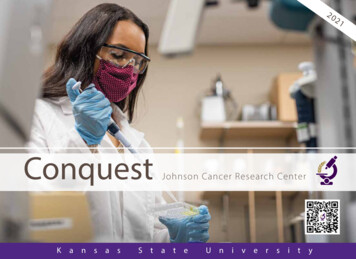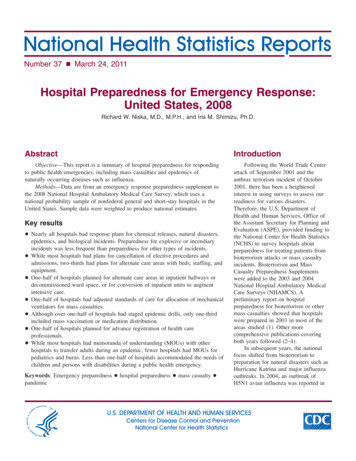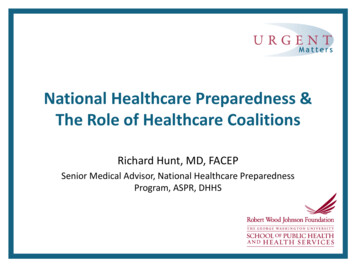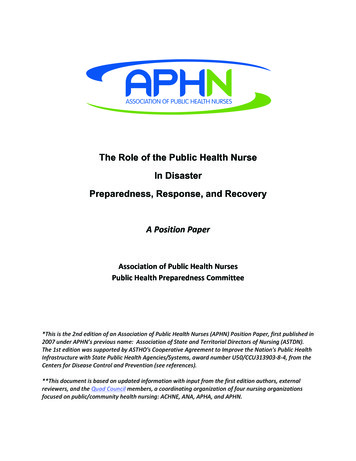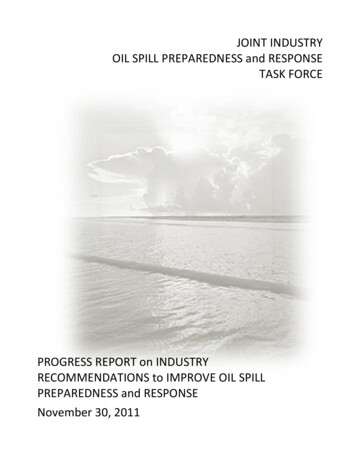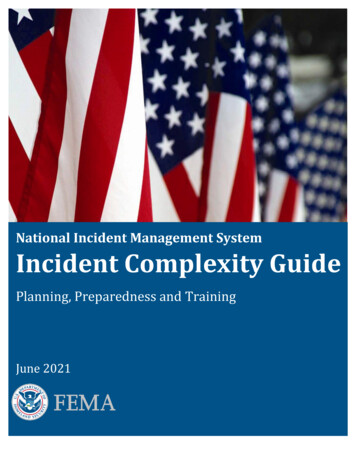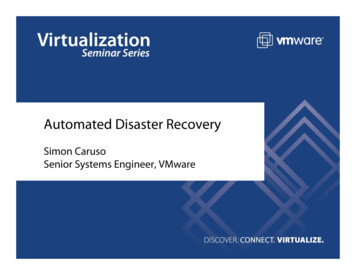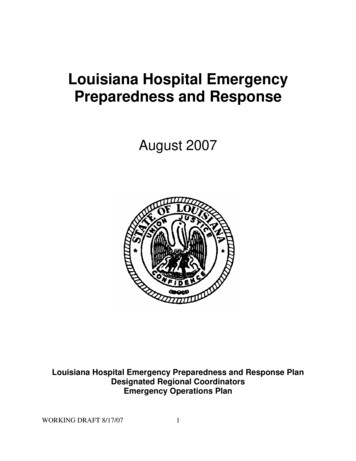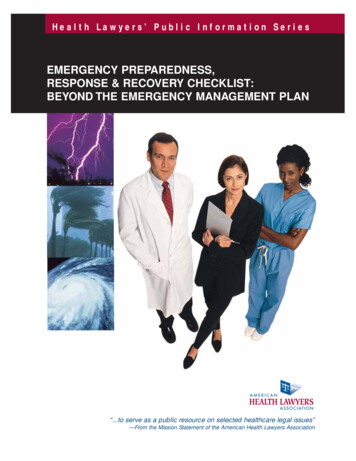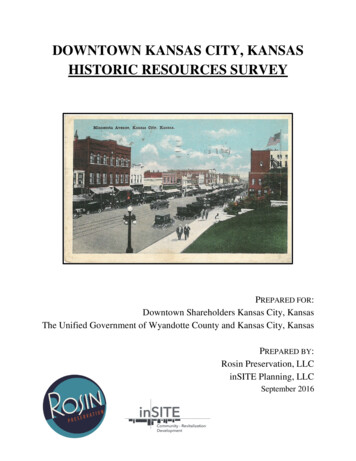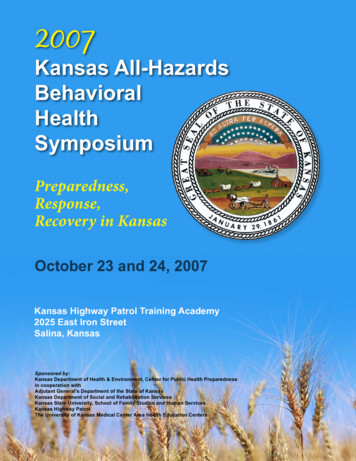
Transcription
2007Kansas esponse,Recovery in KansasOctober 23 and 24, 2007Kansas Highway Patrol Training Academy2025 East Iron StreetSalina, KansasSponsored by:Kansas Department of Health & Environment, Center for Public Health Preparednessin cooperation withAdjutant General’s Department of the State of KansasKansas Department of Social and Rehabilitation ServicesKansas State University, School of Family Studies and Human ServicesKansas Highway PatrolThe University of Kansas Medical Center Area Health Education Centers
Conference InformationBackgroundThe All-Hazards Behavioral Health Symposium is a collaborativeeffort between the Kansas Department of Health and Environment(KDHE), Adjutant General’s Department of the State of Kansas,Kansas Department of Social and Rehabilitation Services (SRS),Kansas State University School of Family Studies and HumanServices, and the Kansas Highway Patrol (KHP). Funding for theSymposium is from a Health Resources and Services Administration (HRSA) grant to KDHE.MissionTo increase the knowledge base for Behavioral Health Specialistsfor response to emergency events or acts of terrorism. To increasethe visibility of a behavioral health professional’s role in emergencyresponse to all hazards. To increase the knowledge base andawareness of emergency responders for disaster-related behavioralhealth issues.DescriptionThe Symposium is divided into five main tracks: Preparedness,Response & Recovery, Individual Response, Special Populationsand Disaster & Emergency Management. Selection of a specific trackis not required. However, pre-registration into courses is required forscheduling purposes. Registration is limited to 300 participants.LocationThe Symposium will be hosted by the Kansas Highway Patrol Training Academy at 2025 East Iron Street, Salina, KS.ObjectivesAt the conclusion of the symposium, the participants will be able to:1. Identify the role of cultural, social and behavioral factors in determining the delivery of public health services, relevant to disasterbehavioral health.2. Collaborate with community partners to promote the health of thepopulation, relevant to disaster behavioral health.3. Identify and retrieve current relevant scientific evidence, relevantto disaster behavioral health.4. Help create key values and shared vision and use these principlesto guide action, relevant to disaster behavioral health.Registration InformationThe registration fee is 60.00. Pre-registration deadline is Tuesday, October 9, 2007. Registrations received after October 9 willnot guarantee space, handout materials, refreshments and lunch.Registrations at the door will be accepted only if space is available.Registration is not complete until payment is received. Ways toregister are: Online with KS-TRAIN at http://ks.train.org; by mailingthe registration form to KUMC AHEC East, PO Box 296, Pittsburg,KS 66762; or by faxing registration form to (620) 235-4041.Cancellation PolicyA registrant may cancel by October 9, 2007, to receive a refund,minus a 15 administrative fee. After that time, no refunds will bemade. The registration fee will not be transferred to future offerings. Refunds are made by mail. The sponsors reserve the right tocancel this program and return all fees in the event of insufficientregistration. The liability of the sponsors is limited to the registrationfee. The sponsors will not be responsible for any losses incurred byregistrants, including but not limited to airline cancellation chargesor hotel deposits.Motel InformationPlease call (620) 235-4040 for a listing of Salina accommodations.Kansas Highway Patrol AcademyStandard of DressThe Kansas Highway Patrol Training Academy dress code includes:Departmental uniform or casual attire, (including jeans/dockers).Apparel unacceptable for wear includes: shorts, tank tops or sandals. Additionally, headgear shall not be worn indoors. Exceptionsto the above may be approved by the director for special classes.Clothing with obscene, vulgar, or suggestive logos, printing, orwording are never in good taste and will not be tolerated. Personal attire and demeanor shall reflect the highest standards. TheTraining Director may require any person in violation to leave thepremises until the deficiency is corrected.Kansas Highway Patrol Academy ParkingDesignated parking for students and instructors is located immediately off Iron Street in the large parking lot. Upper level parking isreserved for academy visitors and those with special needs only.PLEASE DO NOT PARK AUTOMOBILES IN RESERVED AREASAROUND THE ACADEMY BUILDINGS. Parking to the east, (right),of the academy beyond the “NO PARKING” sign could result in yourvehicle being towed as this is private property. Shuttle service willbe provided to usher attendees from the parking lot to the conference building.Continuing Education CreditPhysicians: The University of Kansas Medical Center Office ofContinuing Medical Education is accredited by the AccreditationCouncil for Continuing Medical Education (ACCME) to providecontinuing medical education for physicians.The University of Kansas Medical Center Office of Continuing Medical Education designates this educational activity for a maximumof 11.5 AMA PRA Category 1 Credit(s) . Physicians should onlyclaim credit commensurate with the extent of their participation inthe activity.Nurses: The University of Kansas Medical Center Area Health Education Center East, as an approved provider of continuing education by the Kansas State Board of Nursing, presents this offering fora maximum of 13.8 contact hours credit applicable for relicensureof RNs, LPNs and LMHTs. Kansas Provider Number LT0056-0749.Continuing nursing education credit will be prorated according todocumented attendance.EMS: The University of Kansas Medical Center Area Health Education Center East, as an approved program provider by the KansasBoard of EMS, approves this program for a maximum of 13.8 hoursof continuing education. Provider # PP-4040. Continuing EMScredit will be prorated according to documented attendance.Mental Health Professionals: A certificate of attendance will beissued and may subsequently be submitted by attendees to receiveBSRB credit.Addiction & Prevention Professionals: Application has beenmade to the Kansas Association of Addiction Professionals for 11.5hours of continuing education.All other attendees will receive a certificate of attendance.Program AccessibilityWe accommodate persons with disabilities. Please call (620) 2354040 or mark the space indicated on the registration form and a representative will contact you to discuss your accommodation needs.The sponsors of this symposium are committed to providingprograms and activities to all persons, regardless of race, religion,color, sex, disability, national origin, ancestry, sexual orientation,marital or parental status; and, to the extent covered by law, age orveteran status.
Keynote SpeakersApril Naturale is a licensed, clinical social worker and aPh.D. candidate at New York University where she is studyingthe effects of secondary traumatic stress in trauma counselorswho respond to disasters. Ms. Naturale served as the Directorof Network Development for the National Suicide PreventionLifeline and is the former Statewide Director for Project Liberty,the New York State Office of Mental Health’s response to theWorld Trade Center attacks of 9/11/01. She provides disastermanagement and planning, consultation and training nationally as well as internationally and serves as a governing boardmember of Psychology Without Borders.April will be sharing a detailed description of the operationalstructure, outreach strategies, media campaign and evaluationdata utilized in the New York 9/11/01 disaster behavioral healthresponse program with comparisons to the programs conducted in Alabama, Mississippi and Texas post Hurricanes Katrina,Rita and Wilma as well as the continuing program in Louisiana.Lori A. Hoffner has been offering training for positive youthdevelopment, community networking and relationship building forthe last 10 years. She recently joined the RubySpeaks, Inc. teamof trainers and consultants to continue providing training to various businesses; schools; park and recreation districts; and youthworkforce agencies. Lori is the Executive Director of PACCT, asmall non-profit in Jefferson County, Colorado, an organizationdedicated to the success of youth and community. Following thetragic shootings at Columbine High School in 1999, Lori, throughher leadership with PACCT, was invited to help with the creationof Columbine Connections Resource Center, a community centerdedicated to the healing of those impacted and SHOUTS, a teendrop-in center for the youth of the community. Lori worked closelywith leaders from mental health organizations, the school district,local law enforcement and park and recreation agencies. Lori ishighly regarded as a network agent for community collaborations.Lori will be discussing her experience in the aftermath of theColumbine High School shootings. She will share how the tragicevents of April 20, 1999 forced everyone to dig deep and recognize what can be done together.Concurrent Session SpeakersMike BonielloBill Brubaker, Regional Coordinator-Northeast, KansasHomeland Security and Kansas Emergency ManagementMichael Cameron, Risk Communications Specialist for theKansas Department of Health and Environment, Office ofCommunications, Topeka, KansasNancy Crump, MS, LCP, GC-C, Director of Family CareServices, D.W. Newcomer’s Sons Funeral Homes andCemeteries, Overland Park, KansasRichard L. Gaskill, Ed.D., LCP, Clinical Director and DeputyDirector of Sumner Mental Health Center, Wellington, KansasBriana S. Goff, PhD, LCMFT, Project Coordinator, KansasAll-Hazards Behavioral Health Program; Associate Professorof Marriage and Family Therapy in the School of FamilyStudies and Human Services; and Associate Dean forAcademic Affairs, College of Human Ecology, Kansas StateUniversity, Manhattan, KansasSam Graham, DVM, Kansas Animal Health Department,Kingman, KansasCharlie Griffin, MS, LMFT, Research Assistant Professor,Kansas State University, Manhattan, KansasClaude Guidry, LMSW, Social Worker for Kansas CityVeterans Affairs Medical Center, Operation Enduring Freedom/Operation Iraqi Freedom Recovery ProgramGary Hawley, PsyD, LP, Psychosocial Recovery Coordinatorand Acting Supervisory Psychologist, Robert J. Dole VA Medical Center, Wichita, KansasSuzanne Hawley, PhD, MPH, LP, Assistant Professor and KUMPH Site Director, Department of Preventative Medicine & PublicHealth, University of Kansas School of Medicine, Wichita, KansasWes Jones, PhD, LCMFT, Director of Children’s Services andDirector of Program Evaluation and Development, Mental HealthCenter of East Central KansasTeresa KasperGreg Morgan, MS, Contingency Planner, Kansas Department ofHealth and Environment, Center for Public Health Preparedness,Topeka, KansasSister Nora Phelan, CSJ, Director of Ethics, Via Christi WichitaHealth Network, Wichita, KansasSharon Powell-Quincy, LBSW, Retired Volunteer with AmericanRed Cross, Disaster Management, Wichita, KansasBecky Rinehart, LCP, Team Leader, State Planning & Coordination, All-Hazards Behavioral Health Preparedness & Response,SRS/Health Care Policy/Mental Health, Topeka, KansasGeo. A. “Chip” Westfall, Retired Lieutenant, Kansas HighwayPatrol and current PEER Team CoordinatorStephanie Wick, MS, LMFT, Operations Manager, Kansas AllHazards Behavioral Health Program and is a licensed Marriageand Family Therapist and grief counselor in state of Kansas,Manhattan, Kansas
Conference AgendaTuesday, October 23, 20077:45 a.m. - 8:45 a.m.Registration8:45 a.m. - 9:00 a.m.Welcome9:00 a.m. - 10:00 a.m.Panel Discussion from State Leaders: Responding to Disaster: A State in ActionRepresentatives from the SRS, KDHE, Kansas Highway Patrol, Adjutant General’sDepartment, and the Governor’s Office10:00 a.m. - 11:45 a.m.Opening Keynote Presentation:Disaster Behavioral Health: From New York to Louisiana - April Naturale , MSW, ACSW11:45 a.m. - 1:00 p.m.Lunch (provided)1:00 p.m. - 2:45 p.m.Session I Concurrent Session Tracks:PreparednessTrackA1PART I - KAHBH CoreTraining:1. KAHBH Overview2. Behavioral Health &the All-Hazards Response SystemStephanie WickBriana GoffLevel: BeginnerResponse &Recovery TrackIndividual ResponseTrackSpecial PopulationsTrackDisaster & EmergencyManagement TrackA2Ethical Decision Makingin Times of CrisisA3Compassion Fatigue:The Cost of CaringA4Animals in Disaster:Emergency Planning forAnimal WelfareA5Continuity of OperationsPlanningSister Nora PhelanMike BonielloSam GrahamCharlie GriffinGreg MorganLevel: BeginnerLevel: Intermediate2:45 p.m. - 3:00 p.m.Break3:00 p.m. - 4:45 p.m.Session II Concurrent Session TracksLevel: BeginnerLevel: BeginnerPreparednessTrackResponse &Recovery TrackIndividual ResponseTrackSpecial PopulationsTrackDisaster & EmergencyManagement TrackB1PART II - KAHBH CoreTraining:3. Disaster Classifications & Phases4. Traumatic Reactionsto DisastersB2KAHBH Coordinator’sTraining(for KAHBH CMHCCoordinators only)B3Partnering with Schoolsin Times of DisasterB4Issues for Families andChildren in DisastersB5NIMS and GreensburgStephanie WickBriana GoffBecky RinehartTeresa KasperNancy CrumpBill BrubakerLevel: BeginnerLevel: AdvancedLevel: IntermediateLevel: IntermediateLevel: Intermediate
Conference AgendaWednesday, October 24, 20078:00 a.m. - 9:45 a.m.Keynote Presentation:Finding Strength in the Aftermath of Tragedy: Recovery After Columbine - Lori Hoffner, PACCT9:45 a.m. - 10:00 a.m.Break10:00 a.m. - 11:45 a.m.Session III Concurrent Session Tracks:PreparednessTrackC1PART III - KAHBH CoreTraining:5. KAHBH CommunityOutreach Team6. Providing SupportDuring DisastersStephanie WickBriana Nelson GoffLevel: BeginnerResponse &Recovery TrackIndividual ResponseTrackSpecial PopulationsTrackDisaster & EmergencyManagement TrackC2Implementing a PEERSupport TeamC3The Impact of Traumaon Human Brain Development: What EveryDisaster ResponderNeeds to Understand tobe Effective in the FieldC4Displacement by Disaster: Losing Your Homeand the ImplicationsC5Recapping the 2007Disasters: A Critique forRespondersGeo. A. “Chip” WestfallRichard L. GaskillSharon Powell-QuincyWes JonesLevel: IntermediateLevel: Intermediate11:45 a.m. - 1:00 p.m.Lunch (provided)1:00 p.m. - 2:45 p.m.Session IV Concurrent Session Tracks:Level: BeginnerLevel: IntermediatePreparednessTrackResponse &Recovery TrackIndividual ResponseTrackSpecial PopulationsTrackDisaster & EmergencyManagement TrackD1PART IV - KAHBH CoreTraining:7. Considerations forSpecial Pop., CulturalComp., & EthicalIssues8. Round Table ExerciseD2Risk and Crisis Communication: TargetingBehavioral Health ofSpecial PopulationsD3Resiliency and Behavioral Health RecoveryFollowing DisastersD4Understanding WarZone TraumaD5Recapping the 2007Disasters: LessonsLearnedStephanie WickBriana Nelson GoffMichael CameronGary HawleySuzanne HawleyClaude GuidryWes JonesLevel: IntermediateLevel: IntermediateLevel: BeginnerLevel: BeginnerLevel: BeginnerConcurrent Session Levels:Beginner: Presentation focuses on fundamental principles and theory regarding the subject. Targeted to attendees who have little or noexperience with the subject.Intermediate: Presentation will add to or develop existing skills or knowledge. Targeted to attendees who are familiar with the subject.Advanced: Presentation will focus on research, theory development or emerging knowledge. Targeted to attendees who have considerableexperience with the subject.
Concurrent Session TracksSpecial Populations TrackPreparedness TrackKAHBH Core Training - A1, B1, C1, D1Presenters: Stephanie Wick and Briana GoffLevel: BeginnerThis eight-hour training will cover key areas of disaster preparedness, response,and recovery. Participants must complete the entire eight-hour trainingin order to receive credit. Individuals who have completed the KAHBH CoreTraining may respond with the KAHBH Network during Presidentially declareddisasters in Kansas. KAHBH members respond to disasters in Kansas andperform outreach and disaster crisis counseling services to affected individuals, families, and responders.Response & Recovery TrackEthical Decision Making in Times of Crisis - A2Presenter: Sister Nora PhelanLevel: BeginnerThis session will seek to explore some of the ethical issues that occur in timesof crisis and how these may differ from usual patterns, particularly when thisinvolves health care concerns.KAHBH CMHC Coordinator’s Training - B2Presenter: Briana Goff and Becky Rinehart(For KAHBH CMHC Coordinators only)Level: AdvancedThis workshop will provide an opportunity for KAHBH CMHC Coordinatorsto ask questions, clarify roles, and review the events of the previous months.Coordinators will be briefed on the KAHBH program’s response to 2007disasters.Implementing a PEER Support Team - C2Presenter: Geo. A. “Chip” WestfallLevel: IntermediateThis course is designed to suggest ideas on how to build a CISM/PEER team.Additionally, an overview of the Kansas Highway Patrol PEER Team’s day-today operations.Risk and Crisis Communication: Targeting Behavioral Health ofSpecial Populations - D2Presenter: Michael CameronLevel: IntermediateSession will discuss needs of various special populations and offer advice onpreparing messages that address these needs. Attention will be given to forming messages that alert people without alarming them during a crisis to havea positive impact on the behavioral health of all those affected. Tips will begiven on enlisting assistance from community resources such as faith-basedorganizations to reach special populations.Individual Response TrackCompassion Fatigue: The Cost of Caring - A3Presenter: Mike BonielloPartnering with Schools in Times of Disaster - B3Presenter: Teresa KasperLevel: IntermediateLevel: IntermediateThe Impact of Trauma on Human Brain Development: What Every Disaster Responder Needs to Understand to be Effective in the Field - C3Presenter: Richard L. GaskillLevel: IntermediateNeuroscience has produced incredible insights into the human brain whichchallenges many traditional notions about management of individualsexposed to traumatic events. Under severe or chronic stress various areasof the human brain will alter how they organize and process information.Further, information stored in one part of the brain may not be accessible toother parts of the brain. These and other principles begin to explain commonsymptoms of Depression, Acute Stress Responses, Anxiety, and PTSD, aswell as other emotional maladies often seen in trauma survivors. These fundamental concepts provide a firm foundation for effective disaster responseby guiding intervention strategies.Resiliency & Behavioral Health Recovery Following Disasters - D3Presenters: Gary Hawley and Suzanne HawleyLevel: IntermediatePsychological responses in the aftermath of an all-hazards event are varied.Although some survivors of disasters and terrorism events seem to respondand rebound in healthy ways, others do not. This presentation is designedto address the community and individual responses following the responsephase of an all-hazards event. Resiliency factors will be highlighted as well asemerging research from recent disaster and terrorism events. The bufferingfactors that can lessen the debilitating symptoms for patients and providers willalso be emphasized.Animals in Disaster: Emergency Planning for Animal Welfare - A4Presenters: Sam Graham and Charlie GriffinLevel: BeginnerExperience in recent disasters and subsequent research highlights theimportance of careful advance planning and preparation for animal disasterwelfare issues. Human safety and protection of life as well as animal healthand safety can be dramatically improved by attention to concerns prior toemergency events.Issues for Families and Children in Disasters - B4Presenter: Nancy CrumpLevel: IntermediateThis course will provide an overview of the reactions of children to traumabased on their developmental age. Participants will understand the impact oftraumatic events within the family system, complications to look for in childrenand families, what helps in the immediate aftermath, and long-termed recovery needs in disasters. Participants will leave with information packets andresources.Displacement by Disaster: Losing Your Home & the Implications - C4Presenter: Sharon Powell-QuincyLevel: BeginnerFocus will be on both catastrophic national disasters as well as recent statedisasters that have produced temporary and permanent loss of home. Theintent is to identify as closely as possible the sense of loss this represents toindividuals and families. Participants will gain new empathy as well as knowledge of practical interventions to assist victims of disasters and loss of homewith their recovery.Understanding War Zone Trauma - D4Presenter: Claude GuidryLevel: BeginnerThe participant will be given information and anecdotes on various war zonetrauma issues. Time will be spent on explanations of Battlemind, PTSD, andTBI. A lively, energetic presentation filled with current information about theAfghanistan and Iraq Wars will be presented. As much as possible, real-lifewar experiences will be utilized in the presentation. It is hoped that this basicinformation will lead the attendee to seek more education about war zonetrauma assessment and treatment.Disaster & Emergency Management TrackContinuity of Operations Planning - A5Presenter: Greg MorganLevel: BeginnerIn an emergency it is important for all providers to have Continuity of Operations Plans (COOP) in place so that they will be prepared to continueessential services during an event and return to normal operations as soonas possible after an event. Using the Critical Elements of a Viable COOPplan, the Kansas Department of Health and Environment Center for PublicHealth Preparedness has developed a COOP template for use by health careentities in Kansas. These templates include protocols for COOP activation,determining responsibilities of key staff members, delegation of authority,orders of succession, and COOP deactivation protocols.NIMS and Greensburg - B5Presenter: Bill BrubakerLevel: IntermediateThis presentation will discuss the NIMS model and how it was applied at theGreensburg event. Lessons learned and how to make improvements will bepresented.Recapping the 2007 Disasters: A Critique for Responders - C5Presenter: Wes JonesLevel: IntermediateThis session is intended for individuals who responded to the 2007 winterice storms, Greensburg tornado, or Southeast Kansas flooding. The sessionwill be in discussion format and is intended to provide responders with theopportunity to critique their experiences during disaster situations.Recapping the 2007 Disasters: Lessons Learned - D5Presenter: Wes JonesLevel: BeginnerThis session is open to all symposium participants. It is intended to providean open discussion about the lessons learned during and since the 2007winter storms, Greensburg tornado, and SE Kansas flooding. This sessionwill help to generate ideas for better responses in the future.
Registration Form2007 Kansas All-Hazards Behavioral Health SymposiumOctober 23 & 24, 2007Pre-registration deadline is October 9, 2007! Limited to 300 participants!Ways to Register:BCOnline with KS-TRAIN at http://ks.train.org (secure link to credit card registration)Complete registration form below and mail to:DKUMC AHEC East, PO Box 296, Pittsburg, KS 66762Fax registration form to: (620) 235-4041NameHome AddressCityStateProfessional TitleLicense No.ZipPlace of EmploymentHome PhoneWork PhoneE-mail AddressConcurrent Session SelectionPlease circle one session for each block of time for a total of four sessions:Tuesday, october 23, 20071 - 2:45 pm:A1A2A3A4A53 - 4:45 pm:B1B2B3B4B5D1D2D3D4D5wednesday, october 24, 200710 - 11:45 am:C1C2C3C4C51 - 2:45 pm:The registration fee is 60.00. Registrations received after October 9 will not guarantee space, handout materials,refreshments and lunch. Registrations at the door will be accepted only if space is available. Registration is not complete until payment is received.Method of Payment:Check enclosed for (payable to KUMC AHEC East)P.O. #Charge my Credit Card: (please include copy of P.O.)Mastercard VISACard #Exp. DateIf you are paying with a credit card, we strongly urge you to register online at:http://kuahec.kumc.edu/conferencesNOTICE: If you will need special accommodations, please check the box and you will be contacted personally by a member of theKUMC AHEC staff.Please contact our office if you have special dietary needs.Questions? Call (620) 235-4040
AHEC EastPO Box 296Pittsburg, KS 66762-02962007 Kansas All-Hazards Behavioral Health Symposium2007 Kansas All-Hazards BehavioralHealth SymposiumPreparedness, Response & Recovery in KansasOctober 23 and 24, 2007Pre-registration deadline October 9, 2007!Sponsored by the Kansas Department of Health & Environment, Center for Public Health Preparednessin cooperation with Adjutant General’s Department of the State of KansasKansas Department of Social and Rehabilitation ServicesKansas State University, School of Family Studies and Human ServicesKansas Highway Patrol andThe University of Kansas Medical Center Area Health Education Centers
EMS: The University of Kansas Medical Center Area Health Educa-tion Center East, as an approved program provider by the Kansas Board of EMS, approves this program for a maximum of 13.8 hours of continuing education. Provider # PP-4040. Continuing EMS credit will be prorated according to documented attendance.

